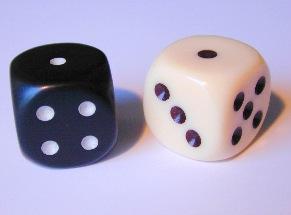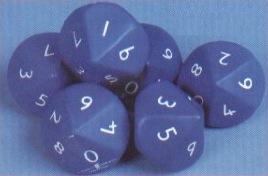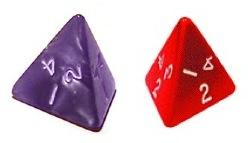A Bit of a Dicey Problem
When you throw two regular, six-faced dice you have more chance of getting one particular result than any other. What result would that be? Why is this?
Problem

Look at these two dice. If you add together the numbers of dots on them, the total is $2$.
When you roll two ordinary six-faced dice like these and add together the two numbers, what results could you get?
Do you have more chance of getting one answer than any other?
If so, what is that answer? And why?
What if you use a dice with $10$ numbers on, like these?

What answers could you get now?
Do you have more chance of getting one answer than any other?
If so, what is that answer? And why?
Now try with more dice or a mixture of dice. What do you notice now?
Getting Started
Perhaps start with small numbers like the tetrahedral dice.

Here we read the number that's on three faces that touch the table - in this case $1$ and $2$.
If you do not have any then they can be made from this net.
Student Solutions
William from Churchers College Junior School sent in his good explanations.
$1$a You can roll numbers between $2$ and $12$ with two six-sided dice
b $7$: Because you can roll combinations which use all the numbers on the dice.
$1-6$, $6-1$, $5-2$, $2-5$, $4-3$, $3-4$
$6$ combinations give $7$.
There are $36$ possible combinations when you threw two six-sided dice SO $6$ /$36 \times 100 = 16.67$ % chance of rolling $7$ with two six-sided dice.
$2$a With two ten-sided dice you can roll numbers between $2$ and $20$.
b $11$; because there are ten combinations which give $11$ which use all the numbers on the dice
There are are $100$ possibilities when you roll two ten-sided dice.
So $10$/$100 \times 100 = 10$ % chance of rolling $11$ with $2$, $10$ sided dice.
From Oscar at CCJS (which I think is Cheltenham College Junior School - but forgive me if I'm wrong!) also worked on this and sent in the following;
I wrote down every possible throw I could get using a black and white six-faced dice - it came to $36$ possibilites.
I counted how many of each total number I could get and found that the commonest total number to get was $7$
Two six-faced dice gave me $36$ possibilities. That is $6$ squared or $6 \times 6$.
The two six-faced dice had $7$ as the commonest number that we could get - that is, one greater than the number of sides on each dice.
Finally Tom from Fen Ditton C.P. School wrote to tell us what he already knew or what he found out by doing the activity:
$6$ numbered dice: the most likely number is $7$ because is has got the most combinations.
$10$ numbered dice: $11$ is the most likely because it has the most combinations.
The formula for this problem is:n $+1$ n= no. of sides on the die.
Well done all of you, three excellent solutions sent in, keep up the good work!
Teachers' Resources
Why do this problem?
Possible approach
Introduce the task by getting the children to throw two dice in pairs with one throwing the dice and one recording the results. If each pair in the class records their results for 5 throws then collectively they can make a conjecture about what the outcomes may be.
After a number of trials they may be willing to make a hypothesis about the most likely result. It is important to press them to offer a rationale for their choice at this stage. They may be willing to justify their choice on the basis of an argument that doesn't involve collecting lots of examples or they may only be prepared to use the evidence that they have gathered.
They could record their arguments and justifications by using a video camera, or on paper and then share them with the rest of the class at intervals during the lesson.
Key questions
How can you be sure you have considered all the possibilities?
Are you getting one result more often than the others?
What do you notice about the number of 1s, 2s, 3s,... that you have?
Possible extension
Consider other polyhedra dice or a mix of different dice.
What about dice that have different sets of numbers on them, such as a six sided dice having 2,4,6,8,10,12 on the faces?
Possible support
